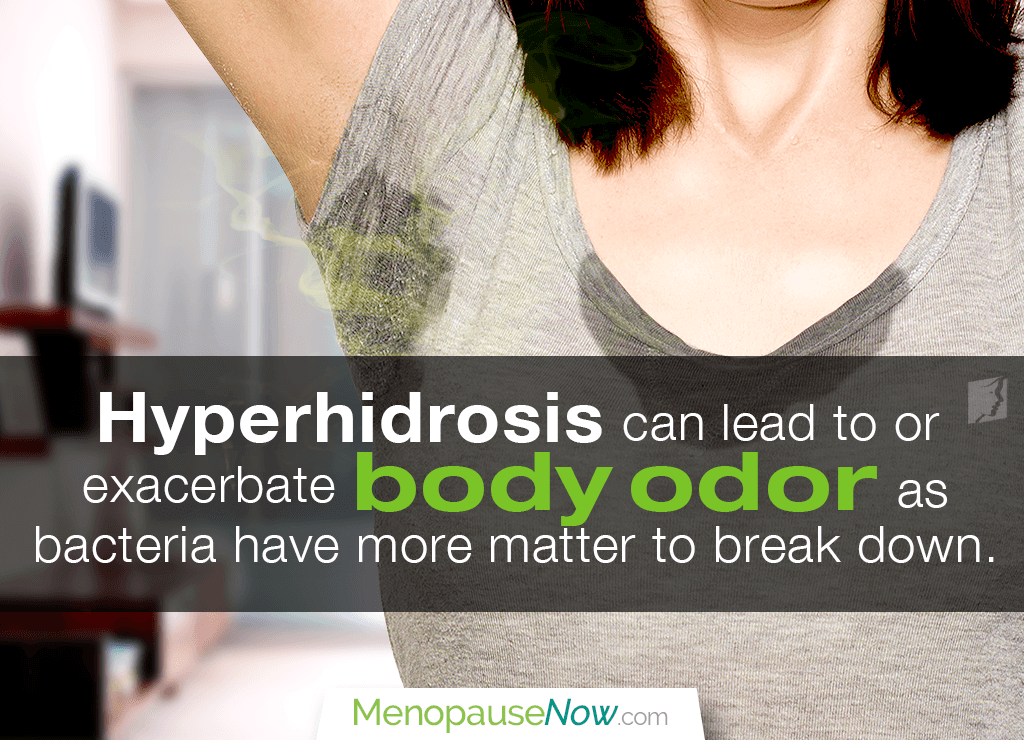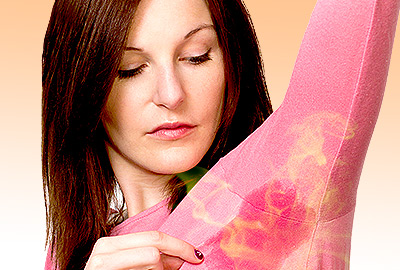Women who suffer from hyperhidrosis and an unpleasant personal scent simultaneously may wonder if the two are connected, and if so, how? Continue reading to learn all about the link between hyperhidrosis and body odor so that you can be one step closer to having the answers you need for enduring freshness.
About Hyperhidrosis
Hyperhidrosis is unusual excessive sweating that is unrelated to physical exertion. It is categorized as the following:
Primary hyperhidrosis. Primary hyperhidrosis is not due to an identifiable medical cause, nor is it classified as a mental health condition even though stress has been found to trigger it.1 This type may be genetic and usually affects just the palms, soles of the feet, and occasionally face.
Secondary hyperhidrosis. Secondary hyperhidrosis is provoked by a health issue - such as hot flashes, thyroid disease, diabetes, nervous system disorders, and infections - or even medications. It generally causes entire body sweating.
Aside from interrupting everyday life, hyperhidrosis may evoke social anxiety and embarrassment.
About Body Odor
It is important to note that sweat does not omit an unpleasant smell.
In and of itself, sweat is just fluid secreted by eccrine and apocrine glands with the purpose of maintaining a stable body temperature. Eccrine glands cover most of the body, while apocrine glands are found where there is hair (think: armpits, groin).
What brings about body odor is when bacteria found on the skin break down components found in the sweat from apocrine glands. When this happens, the bacteria produce waste products, which is what leads to body odor.
The Link
Excessive sweating - or hyperhidrosis - is a perfect ingredient in the recipe for body odor as skin bacteria will naturally have more matter to break down (since there is more sweat).
Moreover, hyperhidrosis can be worsened by stress. Apocrine glands respond immediately to stressful situations, producing a milky fluid that bacteria love to feed on, thus creating a disagreeable smell.
Lastly, for aging women, drastic hormonal fluctuations characteristic of the menopausal transition can alter hypothalamus function, thus encouraging greater sweat production, increased anxiety, and ultimately leading to body odor.
Treatment for Hyperhidrosis and Body Odor
The best treatments will focus on tackling the underlying cause of hyperhidrosis to bring a woman long-lasting relief. For menopausal women, this cause is hormonal imbalance.
Natural and effective body odor treatments that foster endocrine system health focus principally on lifestyle changes alongside the use of alternative medicine. This will not only tackle body odor, but also other pesky menopause symptoms, like hot flashes, mood swings, and more.
Women who are suffering from body odor and hyperhidrosis not due to menopause should work with their doctors to find a solution for their specific health needs.
Medications used to treat both conditions may include prescription antiperspirant, nerve-blocking medications, or antidepressants, among others.
Conclusions
Even though getting rid of body odor from hyperhidrosis may seem like a daunting task, especially if the underlying cause is yet to be identified, it is not impossible. Middle-aged women should rest assured that help is never far from reach, whether natural or pharmaceutical. A little initiative will go a long way in providing you and others relief from nasal discomfort.
Sources
- Cleveland Clinic. (2018). Sweating and Body Odor | Sweating and Body Odor: Care and Treatment. Retrieved November 26, 2019, from https://my.clevelandclinic.org/health/symptoms/17865-sweating-and-body-odor/care-and-treatment?view=print | https://my.clevelandclinic.org/health/symptoms/17865-sweating-and-body-odor/care-and-treatment
- International Hyperhidrosis Society. (n.d.). Sweat and Odor | Stress Sweat Stinks! Retrieved November 26, 2019, from https://www.sweathelp.org/home/sweat-and-odor.html | https://www.sweathelp.org/hyperhidrosis-treatments/antiperspirants/antiperspirant-basics/170-media-contacts/305-stress-sweat-stinks.html
- Mayo Clinic. (2019). Sweating and body odor: Symptoms & causes | Sweating and body odor: Diagnosis & treatment | Hyperhidrosis: Symptoms & causes | Hyperhidrosis: Diagnosis & treatment. Retrieved November 26, 2019, from https://www.mayoclinic.org/diseases-conditions/sweating-and-body-odor/symptoms-causes/syc-20353895 | https://www.mayoclinic.org/diseases-conditions/sweating-and-body-odor/diagnosis-treatment/drc-20353898 | https://www.mayoclinic.org/diseases-conditions/hyperhidrosis/symptoms-causes/syc-20367152 | https://www.mayoclinic.org/diseases-conditions/hyperhidrosis/diagnosis-treatment/drc-20367173
Footnotes:
- Gross, K.M. et al. (2014). Elevated Social Stress Levels and Depressive Symptoms in Primary Hyperhidrosis. PLOS One, 9(3), e92412. doi: 10.1371/journal.pone.0092412




